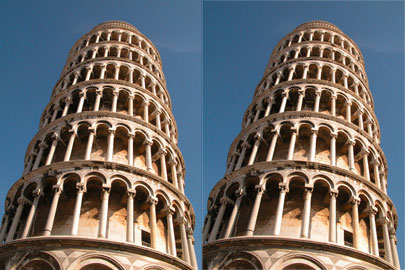Headliners: Big Apple poutine and a fresh take on Pisa
Headliners: Big Apple poutine and a fresh take on Pisa McGill University
User Tools (skip):
Big Apple poutine and a fresh take on Pisa
Paragon of poutine
When astrophysicist Bob Rutledge isn't studying neutron stars and blacks holes, he's looking at how we fill the black hole of our stomach. Despite hailing from Southern California, Rutledge is considered a connoisseur of that unique Quebec culinary concoction, poutine. It seems like the goopy, artery-clogging mess of fries, cheese curds and gravy is enjoying a surge of popularity in the Big Apple of all places. In introducing its readers to the high-caloric newcomer to the chic restaurant scene, the New York Times turned to Rutledge, creator of the website MontrealPoutine.com. While Rutledge may very well be poutine's champion and chief historian, purists might balk at some of the recipes on his website, including one that calls for ground beef, onions and a velouté sauce.
On top of the world
It's an honour Karim Nader won't soon forget. The psychology prof, whose research into developing treatments that could significantly reduce the pain of traumatic memories, was recently named as one of "The Ten People Who Could Change The World" by Forbes magazine. The article described its laureates as "young thinkers and scientists whom you've probably never heard of, doing work that is radically new and potentially world-changing." Nader's research also offers hope to people suffering from epilepsy, obsessive compulsive disorder and drug addiction.
Tricky towers

The two Towers of Pisa: No, really—they're exactly the same.
Courtesy of Adriana Olmos
Take a look at the pair of photos above. Pretty similar, huh? In actual fact, the photos are identical—despite the fact that the tower on the right appears to be tilting at a more severe angle. As reported in Scientific American, this deviously simple optical illusion, created by Frederick Kingdom, Ali Yoonessi and Elena Gheorghiu of McGill Vision Research unit, was recently named as Best Visual Illusion of the Year in a contest sponsored by the Neural Correlate Society. It seems that our brains have been conditioned to see tall objects that are close together, like buildings, rise at the same angle only to come together at the top. When parallel objects don't converge at the top, as with these two pictures, our visual systems are tricked into "seeing" them as actually moving apart.
Breast milk breakthrough
Science Daily recently ran an article highlighting a paper co-authoured by Lindiwe Sibeko, a nutrition PhD student. Preliminary findings of the paper demonstrated that flash-heating, a type of pasteurization in which liquids are heated to a very high temperature for a very short period of time, can eliminate HIV from the breast milk of infected mothers. The study, which will be published in its entirety in the July issue of the Journal of Acquired Immune Deficiency Syndromes, gives hope to mothers in underdeveloped nations because, unlike more involved forms of pasteurization, flash-heating requires little more than a pan and a burner. The World Health Organization estimates that some 40 percent of children who become infected by HIV contract the virus through the breast milk of their infected mothers.
Clash of the titans
He may be known as "Darwin's pit bull," but in this fight, Richard Dawkins may not have a prayer. As one of the world's leading ethicists, Margaret Somerville, the director of the McGill Centre for Medicine, Ethics and Law, never shrinks from a good brouhaha. Recently, she was in her native Australia and squared off against Dawkins, the extreme atheist and bestselling author who delivered last fall's SRO Beatty Lecture. Following the Australian broadcast of the first installment of Dawkins' controversial documentary The Root of All Evil?, Somerville took him to task in the Sydney Morning Herald, calling him a "dangerous man who is causing me disturbed, sleepless nights." In particular, she takes offense at Dawkins's blaming religion for many of the world's ills because, she says, it threatens to escalate "the conflict between warring cultures at a time when we should seek common ground."

